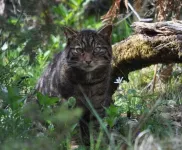(Press-News.org) Simon Fraser University researchers studying the evolutionary history of flu viruses have found that a new quantitative analysis of how they evolved may help predict future strains. The research draws on a field known as phylogenetics, which focuses on how groups of organisms are evolutionarily related, and is published in the journal Science Advances.
Researchers used large phylogenetic ‘trees’ to predict which strains are most likely to grow during the upcoming flu season, and determined that this approach was moderately effective in detecting future strains of the influenza virus, and could be another tool in the toolbox to guide seasonal flu vaccine development.
“The COVID-19 pandemic has caused a significant change in influenza transmission dynamics,” says mathematics professor and Canada Research Chair, Caroline Colijn. “We explored how machine learning can identify influenza virus sequences that are potentially good candidates for inclusion in seasonal influenza vaccines.”
In order for vaccination to be successful, the specific viruses included in seasonal flu vaccines need to be similar to those influenza viruses that will circulate in the upcoming season, Colijn explains. The effectiveness of seasonal influenza vaccines varies (for example, ranging from 25-75 per cent in children), and depends on whether the strains that circulate match those that were projected and included in the vaccine.
Researchers studied phylogenetic trees, essentially the family tree of the influenza virus, with information from the Global Initiative on Sharing Avian Influenza Data (GISAID). After creating phylogenies using over 65,000 RNA sequences from influenza’s surface proteins, collected between 1970 and 2020, they used features in these trees to identify strains that were likely to rise in number in the coming season.
Seasonal influenza vaccine is designed to protect against common influenza viruses including H3N2, H1N1 and B. Their study focused specifically on the H3N2 subtype of influenza virus.
“We were able to identify similar candidate strains to those proposed by the World Health Organization, suggesting that this machine learning approach can help inform vaccine strain selection,” says Colijn.
END
Learning more about how flu strains evolved may help guide future vaccine development – SFU research
2023-11-06
ELSE PRESS RELEASES FROM THIS DATE:
UTSA psychology professor, grad student to research cognitive impairment in cancer patients
2023-11-06
(SAN ANTONIO, NOVEMBER 6, 2023) — The University of Texas at San Antonio (UTSA) associate professor of psychology Joe Houpt, is part of a team that has earned a one-year, $50,000 grant from the Mays Cancer Center at the University of Texas Health Science Center at San Antonio (UT Health San Antonio).
The project, “Surviving is Not Enough: Enhancing Cognitive Function in Cancer Survivors through Movement and Introspection,” aims to measure and enhance the cognitive functioning of cancer survivors at the Mays Cancer ...
Viano receives NSF CAREER Award
2023-11-06
Samantha Viano, Assistant Professor, Education, received funding from the National Science Foundation for the project: "CAREER: Second Chance STEM: Uncovering school policies structuring access to and engagement in high school STEM credit recovery."
Viano will conduct three individual studies as part of this research. The first study will be located in 14 schools in a large and demographically changing suburban school district. This work will be followed by a survey of optimal policy/practice ...
Furst to study disinfection resiliency and microbial risk in drinking water distribution systems during extreme heat disasters
2023-11-06
Kirin Furst, Assistant Professor, Civil, Environmental and Infrastructure Engineering, is set to receive funding from the National Science Foundation for the project: "Disinfection Resiliency and Microbial Risk in Drinking Water Distribution Systems During Extreme Heat Disasters."
Furst and Katherine E. Graham, Assistant Professor, School of Civil and Environmental Engineering, Georgia Institute of Technology, will evaluate the effect of extreme heat on disinfection efficacy and failure risk in drinking water distribution systems, and evaluate a novel engineering solution to improve ...
CEC researchers to receive funding for study aimed at broadening students' mindset for ethical and responsible cybersecurity in AI
2023-11-06
Aditya Johri, Professor, Information Sciences and Technology; Khondkar Islam, Professor, Associate Chair, Undergraduate Studies, Information Sciences and Technology; and Vivian Motti, Associate Professor, Information Sciences and Technology, are set to receive $299,486 from the National Science Foundation for the project: "EAGER: Education DCL: An Embedded Case Study Approach for Broadening Students' Mindset for Ethical and Responsible Cybersecurity in AI."
Using prior research on situated learning and perspectival thinking, the project team will create a series of four ...
Yang receives funding for climate risk profile studies for Africa
2023-11-06
Ruixin Yang, Associate Professor, Geography and Geoinformation Science/Assistant Director, Center for Earth Observing Spatial Research (CEOSR), received $8,000 from the International Food Policy Research Institute for the project: "Climate Risk Profile Studies For Africa."
Yang is producing hazard maps by major crops and by seasons.
He is conducting an extensive review of existing hazard development methods employed by the Research Program on Climate Change, Agriculture and Food Security (CCAFS).
Yang is also developing a Python program that focuses on mapping and identifying ...
Lebovic receives funding for Visiting Research Scholarship at Knight First Amendment Institute At Columbia University
2023-11-06
Sam Lebovic, Professor, History, received funding for: "Visiting Research Scholarship at the Knight First Amendment Institute at Columbia University."
His project will focus on the law and politics of public employee speech, focusing particularly on how a modern bureaucratized American government should manage the speech of its employees while balancing competing democratic values. The project will explore such problems as academic freedom, administrative law, public sector employment law, transparency, and whistleblowing regulation. It will seek to generate new understandings of legal ...
NIH study validates new scale for measuring pandemic-related traumatic stress in children and adults
2023-11-06
The Pandemic-related Traumatic Stress Scale (PTSS) can be used to effectively measure stress related to the COVID-19 pandemic and identify children and adults with higher levels of stress who may need additional mental health support, according to a new study funded by the Environmental influences on Child Health Outcomes Program (ECHO) at the National Institutes of Health.
The study included 17,830 children and adults from 47 ECHO Cohort study sites representing all 50 states, Washington, DC, and Puerto Rico. Researchers split the sample into four groups ...
From molecular rendezvous to brain disease: 1.5 million euros for Berlin researcher
2023-11-06
Dr. Dragomir Milovanovic, a neuroscientist at DZNE’s Berlin site, has been awarded an European Research Council (ERC) “Starting Grant” worth 1.5 million euros to investigate biophysical phenomena relevant to brain diseases in a groundbreaking research project. Ultimately, the goal is to better understand the behavior of aberrant protein inclusions in neurodegenerative diseases.
Human cells are complex entities comprising proteins, lipids and a wide number of other molecular spieces, some of them forming organized compartments, while others virtually float around. “The cell interior ...
Crust-forming algae are displacing corals in tropical waters worldwide
2023-11-06
Over the past few decades, algae have been slowly edging corals out of their native reefs across the globe by blocking sunlight, wearing the corals down physically, and producing harmful chemicals. But in recent years, a new type of algal threat has surfaced in tropical regions like the Caribbean—one that spreads quickly and forms a crust on top of coral and sponges, suffocating the organisms underneath and preventing them from regrowing. In an article publishing in the journal Current Biology on November 6, a team of marine biologists report that peyssonnelioid alga crusts, or PACs, ...
European wildcats avoided introduced domestic cats for 2,000 years
2023-11-06
University of Oxford news release
Strict embargo until Monday, 6 November, 2023. 11.00 (ET) or 16.00 (GMT)
Domestic cats introduced from the Near East and wildcats native to Europe did not mix until the 1960s, despite being exposed to each other for 2,000 years, according to two research papers published today in Current Biology.
An international team has found new archaeological and genetic evidence which transforms our understanding of the history of cats in Europe. The team sequenced and analysed both wild and domestic cats, including ...


